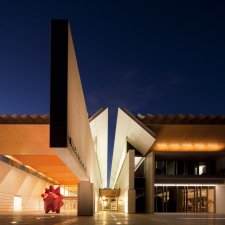- About us
- Support the Gallery
- Venue hire
- Publications
- Research library
- Organisation chart
- Employment
- Contact us
- Make a booking
- Onsite programs
- Online programs
- School visit information
- Learning resources
- Little Darlings
- Professional learning
David Clarke AO (1942-2011), businessman and philanthropist, was the co-founder of Macquarie Bank and its executive chairman from 1985 to 2007. Clark grew up in Sydney, attending Knox and studying economics at the University of Sydney, where he played rugby. (Later, he was chairman of the Australian Rugby Union.) Beginning his career as a broker with the business that became Ord Minnett, he worked his way up to executive chairman at Hill Samuel Australia by 1984. Through negotiations with the British owners of Hill Samuel Australia, Clarke was able to secure an Australian banking licence for a new bank, called Macquarie, of which he became executive chairman in 1985. Macquarie’s extraordinary success and growth is often attributed to Clarke’s ability to select top staff, and encourage individual initiative within the business framework. Beside his personal energetic involvement with, for example, the Salvation Army and Opera Australia (of which he was chair for nine years), under his leadership the Macquarie Group Foundation and Macquarie staff contributed more than $145 million to community organisations worldwide, and carried out thousands of hours of volunteer and pro bono work. In 1988 he established the Pooles Rock winery in the Hunter Valley, extending his operations with the purchase of the Glen Elgin Estate at Pokolbin in 2002; his chardonnay, semillon and pinot noir won many awards and the winery’s restaurant, Rock, was renowned as one of the finest in regional New South Wales. His love of the region led to his public opposition to coal seam gas mining, but after his death the property was sold to mining interests. In the Macquarie Group Foundation’s tribute to Clarke, published in April 2011, many grieving business, charitable and cultural sector leaders reflected on the legacies of his generous way of being.
Purchased 2018
© Gary Ede
Wayne Williams (27 portraits supported)



On one level The Companion talks about the most famous and frontline Australians, but on another it tells us about ourselves.



Visit us, learn with us, support us or work with us! Here’s a range of information about planning your visit, our history and more!



We depend on your support to keep creating our programs, exhibitions, publications and building the amazing portrait collection!